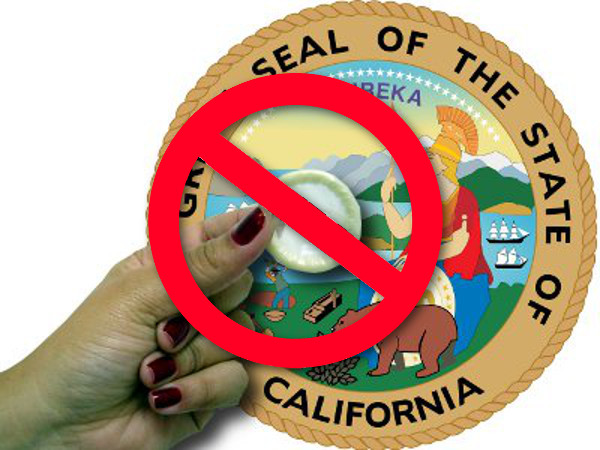Calif.’s Prop 60 Down, but Probably Not Out
 LOS ANGELES – California voters on Tuesday defeated Proposition 60, the notorious Safer Sex in the Adult Film Industry Act, which would have saddled the industry with a laundry list of onerous mandates. Among other things, the initiative included a requirement performers, including married couples, use barrier protection when filming sexually explicit scenes. The measure also mandated studios register with Cal/OSHA every two years and pay for performers’ medical testing and treatment. Prop 60 incorporated heavy fines for even small infractions.
LOS ANGELES – California voters on Tuesday defeated Proposition 60, the notorious Safer Sex in the Adult Film Industry Act, which would have saddled the industry with a laundry list of onerous mandates. Among other things, the initiative included a requirement performers, including married couples, use barrier protection when filming sexually explicit scenes. The measure also mandated studios register with Cal/OSHA every two years and pay for performers’ medical testing and treatment. Prop 60 incorporated heavy fines for even small infractions.
Statewide, the initiative failed by a margin of 54 percent to 46 percent. However, in Los Angeles County, where the majority of the state’s adult studios are located, proponents outnumbered opponents at the polls 51 percent to 49 percent.
Though the proposition is dead for now, some industry insiders aren’t sure the issue will stay buried. After successfully pursuing Los Angeles County’s Measure B — a similar ballot initiative approved by LA County voters in 2012 — the primary backer of Proposition 60 made several unsuccessful attempts to finesse a statewide bill through the legislature before taking the issue directly to voters at a cost of about $23 million. AIDS Healthcare Foundation and its president, Michael Weinstein, are unlikely to let that kind of investment go for naught.
“Weinstein will try again, certainly,” said Michael Stabile, communications director for industry trade organization Free Speech Coalition. “I’m sure he will focus his effort on the Cal/OSHA discussions this January, and suspect in the meantime he’ll file a number of retributive complaints against the studios and performers who opposed the measure. But he’s now wasted over $23 million of money that should be going to treatment and prevention on failed political crusades, and I think he’ll find less and less support for future measures.”
Weinstein repeatedly has remarked that the adult industry would not be able to outrun the regulations he wants instituted in California by simply moving to other states like Nevada, Arizona, New York and Florida, because his organization would mount similar efforts in those areas.
“Prop 60 was soundly defeated despite the fact that its advocates were better-funded [than the opposition],” said industry attorney Lawrence Walters. “Hopefully this will discourage similar efforts in other states, but time will tell.”
Whether or not another battle lurks on the horizon, adult industry insiders breathed a collective sigh of relief on Wednesday.
“This was a tremendous victory, not only for adult performers, but for science over stigma and facts over fear,” noted a statement released by FSC. “Adult industry workers no longer need to fear a punitive law that would have allowed any resident of the state to file suit against them. We were honored to have the Democratic, Republican and Libertarian parties, along with over 55 state newspapers and hundreds of public health and civil rights advocates, stand with adult performers [to oppose the initiative].
“We hope this marks the beginning of a new, safer era for adult film performers and other workers in California — one in which worker voices and lived experiences are included in the legislation and regulation that affects their bodies and their lives,” the statement continued.
“Most of all, we thank the millions of Californians who stood up against worker harassment.”
Worker harassment was a major theme during the campaign. Prop 60 included a provision that would have allowed any resident of California to sue performers, producers and anyone else who held a financial interest in a production if condoms were not visible in the finished product. Complainants who prosecuted successful suits would have been entitled to 25 percent of monetary judgments imposed by the courts. Performers feared such lawsuits, which would have exposed their real names and other personal details, could leave them and their families vulnerable to stalking and other types of abuse.
The Adult Performer Advocacy Committee maintained that notion uppermost in its post-election communication with the industry.
“The industry must use this momentum going forward to address concerns and create a secure work environment that is near-impenetrable to intimidation or persecution from outsiders or from within the industry,” a formal statement distributed by the organization urged. “Building a better community is still a primary goal, and adult film performers have shown, indisputably, how much they can accomplish when goals are set, voices are raised and demands are made. This is a time of celebration, but the work is not done.
“The refusal of California voters to allow legislation that puts performers at risk is a miraculous win,” the statement continued. “Now performers must focus on securing the industry against unfair and uneducated perspectives that may put the industry at risk in the future.”










